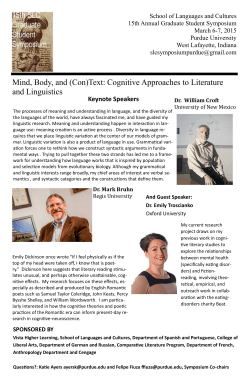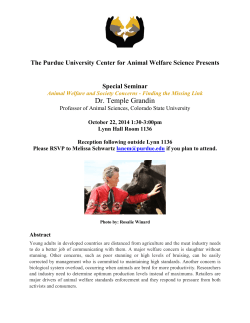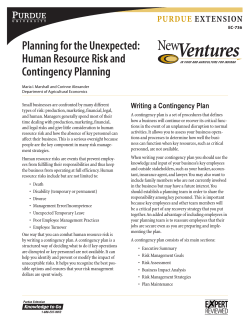
January 18, 2013 An Open Letter to the People of Purdue: Words on paper cannot adequately convey the sense of honor and gratitude with which I joined your ranks this week. I accepted Purdue’s presidency last June with a sense of profound respect for all that this historic institution represents, but the intervening half year has only served to deepen that conviction. I have tried to use the time afforded by the first‐semester interim to learn all I could from and about you. I have made spare‐time and weekend “field trips” to the campus, totaling some seventeen days. These trips have featured briefings on all the major functions of the school and tours of many major facilities. I have spoken to a host of experts across the spectrum of higher education, including more than a dozen current and past university presidents. I have visited campuses including Harvard, Yale, and Chicago, and attended seminars on topics such as the impact of technology and the restructuring of student assistance. And I have read as much as I could manage of the gusher of books, articles, and interviews which are everywhere these days, predicting major change or even upheaval in American higher education. Most useful of all, I have been given the opportunity to meet hundreds of the faculty and students who are Purdue. In college‐by‐college leadership meetings and open forum sessions, and a series of informal lunches, dinners, and evenings in faculty homes, I have commenced what I hope will become years of cordial and mutually rewarding relationships. To all those who attended or arranged these opportunities, heartfelt thanks. Two themes ran steadily through these conversations. First, that Purdue is an extraordinary place, making life‐changing differences in the lives of its students and often the lives of people around the world. Second, that the higher ed world we have known is likely headed for big change, although I heard a full range of opinions about its nature, extent, and what if anything Purdue should do to react to it. I doubt that even the most focused and specialized of Purdue researchers has failed to notice the criticisms and the sometimes apocalyptic predictions swirling around higher education these days. They come from outside observers and lifelong academics and from all points of the philosophical compass. The most frequent attacks include: • College costs too much and delivers too little. Students are leaving, when they graduate at all, with loads of debt but without evidence that they grew much in either knowledge or critical thinking. • Administrative costs, splurging on “resort” amenities, and an obsession with expensive capital projects have run up the cost to students without enhancing the value of the education they receive. • Rigor has weakened. Grade inflation has drained the meaning from grade point averages and left the diploma in many cases as merely a surrogate marker for the intelligence required to gain admission in the first place. • The system lacks accountability for results. No one can tell if one school is performing any better than another. • The mission of undergraduate instruction is increasingly subordinated to research and to work with graduate students. • Too many professors are spending too much time “writing papers for each other,” researching abstruse topics of no real utility and no real incremental contribution to human knowledge or understanding. • Diversity is prized except in the most important realm of all, diversity of thought. The academies that, through the unique system of tenure, once enshrined freedom of opinion and inquiry now frequently are home to the narrowest sort of closed‐mindedness and the worst repression of dissident ideas. • Athletics, particularly in NCAA Division I, is out of control both financially and as a priority of university attention. However fair or unfair these critiques, and whatever their applicability to our university, a growing literature suggests that the operating model employed by Purdue and most American universities is antiquated and soon to be displaced. In the space of a few weeks last fall, a Time cover story called for “Reinventing College,” a Newsweek cover asked “Is College a Lousy Investment?” and a USA Today 2 page one feature declared “College May Never Be the Same.” Other voices, many from inside the academy, had even more striking assessments. Here is just a tiny sampling: • “Bubbles burst when people catch on, and there’s some evidence people are beginning to catch on … kind of like the housing market looked in 2007.” (Prof. Glenn Harlan Reynolds, University of Tennessee) • “Other information industries, from journalism to music to book publishing, enjoyed similar periods of success right before epic change enveloped them, seemingly overnight…Colleges and universities could be next, unless they act to mitigate the poor choices and inaction from the lost decade by looking for ways to lower costs, embrace technology and improve education.” (Jeff Selingo, editorial director, Chronicle of Higher Education) • “Strip away the fancy degrees, the trendy fluff classes, and the personal gadgets, and a new generation of indebted and jobless students has about as much opportunity as the ancient indentured Helots.” (Victor Davis Hanson, Stanford University) • “High prices, low completion rates, and too little accountability.” (Obama administration Secretary of Education Arne Duncan, asked to sum up the state of today’s higher education) • “Too many kids go to college.” (Peter Thiel, founder of PayPal) • “(U)niversities will be committing slow‐motion suicide if they fail to revolutionize their classroom‐based models of instruction…The status quo is already disintegrating.” (Ann Kirschner, dean at Macaulay Honors College, the City University of New York) • “In fifty years, if not much sooner, half the roughly 4,500 colleges and universities now operating in the United States will have ceased to exist…nothing can stop it…(T)he residential college will become largely obsolete; tens of thousands of professors will lose their jobs; the bachelor’s degree will become increasingly irrelevant; and ten years from now Harvard will enroll ten million students.” (Nathan Harden, writing in The American Interest magazine) • And, most succinctly and perhaps most credibly, from Stanford’s esteemed President John Hennessy: “There’s a tsunami coming.” Well, with full respect for President Hennessy, he wouldn’t be the first seismologist to issue a warning about an earthquake that never happened. Still, it seems prudent to ask, given a risk of such an event, how a coastal community should respond. There are three possible categories: 1) “It’s a false alarm. Forget about it.” 2) “There may be a tsunami, but don’t worry, it’s not coming here.” 3) “Get busy, just in case.” 3 I’ve been party to the overreading of trends and the overreactions it can cause; these mistakes have taught me never to be dismissive of criticism or warnings, but also to move cautiously in response. And it’s become my firm conviction these last few months that, whatever the validity of the statements above, Purdue has a chance to set itself apart as a counterexample to much of the criticism lodged against higher ed in general. Presented with such a possibility, we have a duty to seize it. We would fail our duty of stewardship either to ignore the danger signs all around us, or to indulge in denial and the hubris that says that we are somehow uniquely superb and immune. In fairness, I heard very little talk like that during my semester of “freshman orientation.” Instead, I found an openness, and often an eagerness, to embrace departures from existing practices, with the goal of lifting our university to a higher plane of national and world esteem. Based on the reading and listening of these last few months, here are a few observations and some suggestions for our collective attention at the outset of my service: Excellence – Now and then the most obvious truth bears restatement. One such truth is that Purdue is not its buildings, or even its wonderful past and traditions. Purdue at any point in time is its faculty, its students, and the magic that happens when they are brought together effectively. What the legendary President Robert Hutchins said of the University of Chicago a century ago is true of Purdue now: “This would be a great university if it met in a tent.” Gathering and husbanding resources for investment in best‐in‐class faculty, and actions that maximize faculty interaction with students, most particularly including undergraduates, must be top priorities, on all our campuses, this year and every year. Our preeminence in research must not merely be maintained, but strengthened. Excellence in the new era will likely have to be based on something more than reputation. Performance, especially in the intellectual growth of students, will have to be measured, quantified, and documented. Why should our university, already strong in the few indirect measurements that exist, not be a leader in taking accountability for the excellence to which it lays claim? Affordability – There is no denying and no defending it: College costs have exploded in America, especially in the last decade or so. Student debt has soared past a trillion dollars, amounting to far more than total credit card debt. 4 Every university community should embrace the shared responsibility to reexamine current practices and expenditures with a determination to keep its tuition and fees within the reach of every qualified student. We should all remind ourselves every day that the dollars we are privileged to spend come, for the most part, from either a family or a taxpayer. We measure many activities by FTEs, full‐time equivalents; we should likewise see every $10,000 we spend as an “STE,” a student tuition equivalent. Any unnecessary expenditure of that amount could instead have enabled a student to attend Purdue for a full year. Shared governance – I subscribe entirely to the concept that major decisions about the university and its future should be made under conditions of maximum practical inclusiveness and consultation. The faculty must have the strongest single voice in these deliberations, but students and staff should also be heard whenever their interests are implicated. I will work hard to see that all viewpoints are fairly heard and considered on big calls, including the prioritization of university budgetary investments, and endeavor to avoid surprises even on minor matters to the extent possible. Shared governance implies shared accountability. It is neither equitable or workable to demand shared governing power but declare that cost control or substandard performance in any part of Purdue is someone else’s problem. We cannot improve low on‐time completion rates and maximize student success if no one is willing to modify his schedule, workload, or method of teaching. Participation in governance also requires the willingness to make choices. “More for everyone” or “Everyone gets the same” are stances of default, inconsistent with the obligations of leadership. Engagement – A hallmark of our land‐grant mission is the duty to extend our boundaries beyond the campus, to the borders of our state and sometimes beyond. Where once we exported primarily progress in agricultural science, today the opportunity and therefore the duty is much wider. An area of much recent success, but requiring continued emphasis and development, lies in the more rapid and continuous transfer of Purdue technology into the marketplace. We must produce and recruit scholars imbued with a passion to see their genius converted swiftly into goods and services that improve human life, scholars who say as one of Purdue’s most renowned faculty leaders said to me, “It’s not an innovation until it’s useful to someone.” There is no greater societal contribution we could make to a nation struggling to maintain economic opportunity and upward mobility, and there is no more tangible way to demonstrate to our fellow citizens the high return their investments of tax dollars in us can bring. 5 The definition of our targets for engagement does warrant ongoing reflection. As I moved from college to college in my visits to Purdue, the zeal for “global” activities was everywhere, but often unfocused and of widely varying clarity of purpose. A question another great university I visited is asking itself right now may be useful for us as well: “Are we a global university, or an American university with a global perspective?” I have no firm view on this issue other than that any activities beyond our home state’s borders should be carefully chosen, meaningful in impact, and designed for excellence in execution. Open inquiry – A university violates its special mission if it fails to protect free and open debate. It is the wellspring of advancing knowledge and the rationale for academic freedom. No one can expect his views to be free from vigorous challenge, but all must feel completely safe in speaking out. One can hope for a climate of courtesy and civility, and “speech” that attempts to silence or intimidate others must be confronted strongly, but the ensuring of free expression is paramount. This is if anything even more important when the point of the expression is to criticize decisions of the university administration itself. Common purpose – A priceless asset of any great university is the independence of its faculty and the frequent individual breakthroughs, in both teaching and research, that it produces. Again and again, as I have moved through the colleges and gatherings of faculty, I heard the phrase “independent contractors” used to describe the working relationship between the school and its professors. Similarly, I was struck forcefully by the separation among our eleven colleges. A newcomer quickly notices that we are less a “university” than a federation. Obviously, specialization and intellectual autonomy enable the excellence we seek. But, for instance, the widespread duplication of identical functions can work against the common goal we must have of affordability and liberating resources for new investments in faculty and facilities. As so often in life, the phrase “Fine, up to a point” applies. I hope to find, and perhaps here and there to foster, a somewhat stronger sense of common purpose as we work through the decisions presented to us by a changed environment. Without knowing what they will be or when we will make them, many choices will necessitate a communitarian outlook that consciously places the interests of the overall university first. These are but a few preliminary thoughts, each of them stimulated and informed by the interactions of the last six months. As I often said during the Q&A forums of last fall, I reserve the right to be instructed otherwise, and to reverse field when shown I should. But I do urge that we engage on these issues, as many of us as are willing, because the seismologists could well be right this time. 6 Maybe the oldest quip (certainly the tiredest) in the higher ed lexicon is “the fights are so fierce because the stakes are so low.” It’s a great line, and undoubtedly rang true when coined. But the stakes aren’t low anymore. We may well need to fight less fiercely and rally together somewhat more often. My fundamental observation and greatest source of excitement about the chance to enlist with you is that Purdue, already a leader, has a chance to separate further from the pack. In a market now demanding value for the education dollar, we plainly offer it. While others offer curriculum of weak rigor and dubious relevance, we are a proud outlier. As I said to my fellow freshmen at Boiler Gold Rush, “You have chosen a tough school. Congratulations!” And in a world dependent for growth on the rate and quality of technological innovation, Purdue, given the high quality of its discovery and research talent, has a chance to dazzle and deliver. From times of stress and difficulty, in any category of endeavor, strong and farsighted enterprises emerge stronger than before. If there is in fact to be a shakeout in higher education, let’s resolve ourselves that Purdue will not merely survive but thrive, and find itself much higher than today, in the first rank of the world’s great centers of learning. Among the many traditions I admire about our university is its preference not to recognize the arrival of a new president with any kind of ceremony. That suits me fine; if an investiture event had been the custom, I’d have tried to beg out of it. To me, one can best honor a position like this one by simply showing up and going to work. Thank you for letting me do that, and for the marvelously warm welcome you have shown an eager newcomer. For our first century as a nation, U.S. presidents did not travel to Congress and deliver State of the Union orations, they simply wrote them and sent them up to be read at Congress’ convenience. I liked that tradition, too, and thought it better to imitate it here, rather than to create the extra work and possibly the disruption of a staged speech. The spoken part can come next, in what I hope will be countless conversations and consultations about the questions and suggestions presented in this letter. By now it should be apparent that I take up these duties with no agenda other than to strengthen further this magnificent institution, and to help it excel and prosper in whatever new environment it is forced to operate. 7 In a recent biography of Dwight Eisenhower, a Columbia history professor of that time is quoted as saying of Ike’s tenure as Columbia’s president, “He didn’t mess things up. That’s what one hopes for in a President.” Maybe, as in a physician, that’s the first thing one hopes for. But somehow I imagine that most of you join me in much higher expectations and larger dreams. Those who do share those higher aspirations know that we can achieve them only by combining, in thought, talent, word and deed, in the common purpose of preserving what is best today and creating what is better still tomorrow in the Purdue that can be. Mitchell E. Daniels Jr. President 8
© Copyright 2025





















